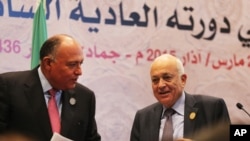A State Department spokeswoman says the Arab League decision to create a joint military force that would counter Iranian and Islamic extremist influence in the region is not having a direct impact on Iran nuclear talks.
However, spokeswoman Marie Harf added that a nuclear deal with Iran could help counter Tehran’s “destabilizing action” in the Middle East region.
Harf commented from Lausanne, Switzerland, on Monday, where negotiators for Iran and the five permanent members of the United Nations Security Council and Germany are trying to reach a framework understanding for future talks on Tehran’s nuclear status, ahead of a self-imposed Tuesday deadline.
“The fact that the [Middle East] region is facing a number of challenges right now is one of the main reasons why we want to diplomatically prevent Iran from getting a nuclear weapon,” said Harf.
On Sunday, leaders of the 22-nation Arab League announced they had agreed to form a unified military force that would work to counter security threats in countries such as Yemen and Libya.
Speaking at the group’s summit in Egypt, Arab League chief Nabil Elaraby said he blamed Iran for what he said was the country’s intervention “in many nations.”
Once formed, the joint military force could play a role in Yemen, where Iranian-backed Houthi rebels seized the capital, Sana’a, last year and began advancing toward the port city of Aden, Yemen’s economic center.
Earlier this month, a Saudi-led coalition began launching airstrikes against Houthi targets in Yemen.
Arab leaders have also expressed concern about Iran’s influence in Iraq. Iran has been helping Iraq push Sunni-dominated Islamic State extremists from some of their Iraqi strongholds.
They have also voiced concern about Iran’s support of Lebanese-based Hezbollah extremists.
But Brookings Institution analyst Bruce Riedel questions whether the Arab League plan for countering extremism will work.
“The Arab League has a long history of failed experiments in joint military plans,” he said in an article for the Washington-based think tank.
Arab leaders have vowed to meet in the coming months to work out operational details of the new force.
Harf said the U.S. will “probably wait to see what shape that takes.” She noted that while the U.S. was not part of the joint Arab military force, it does have “significant security cooperation” with its partners in the region.




